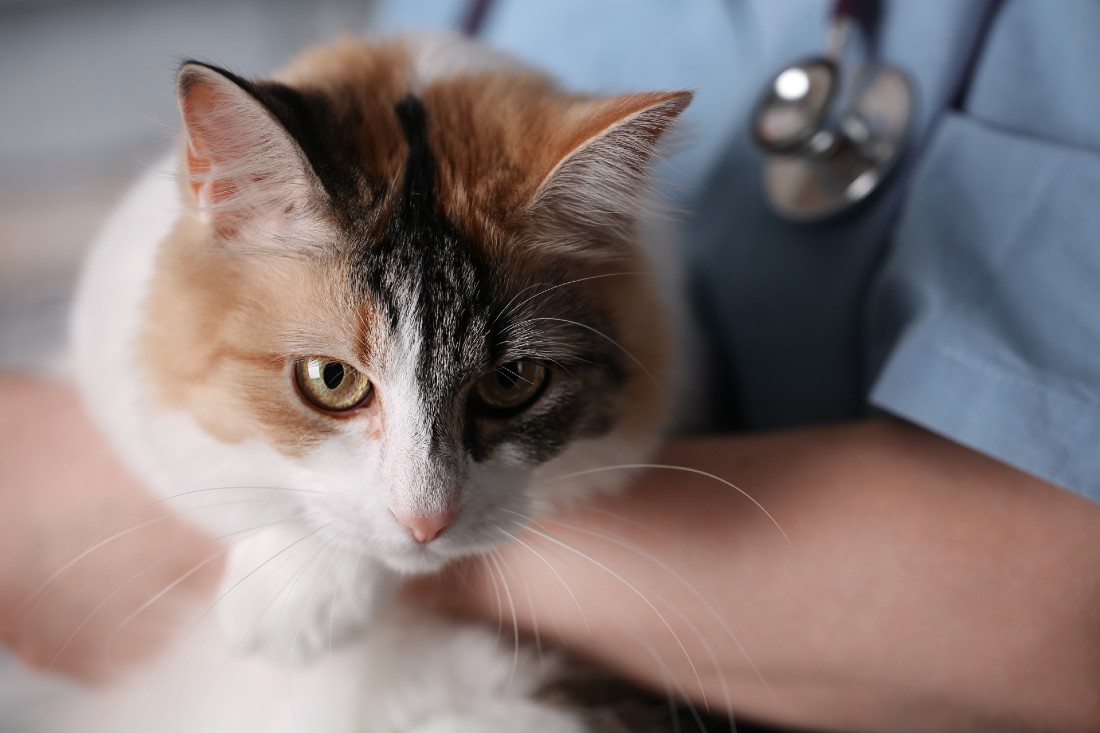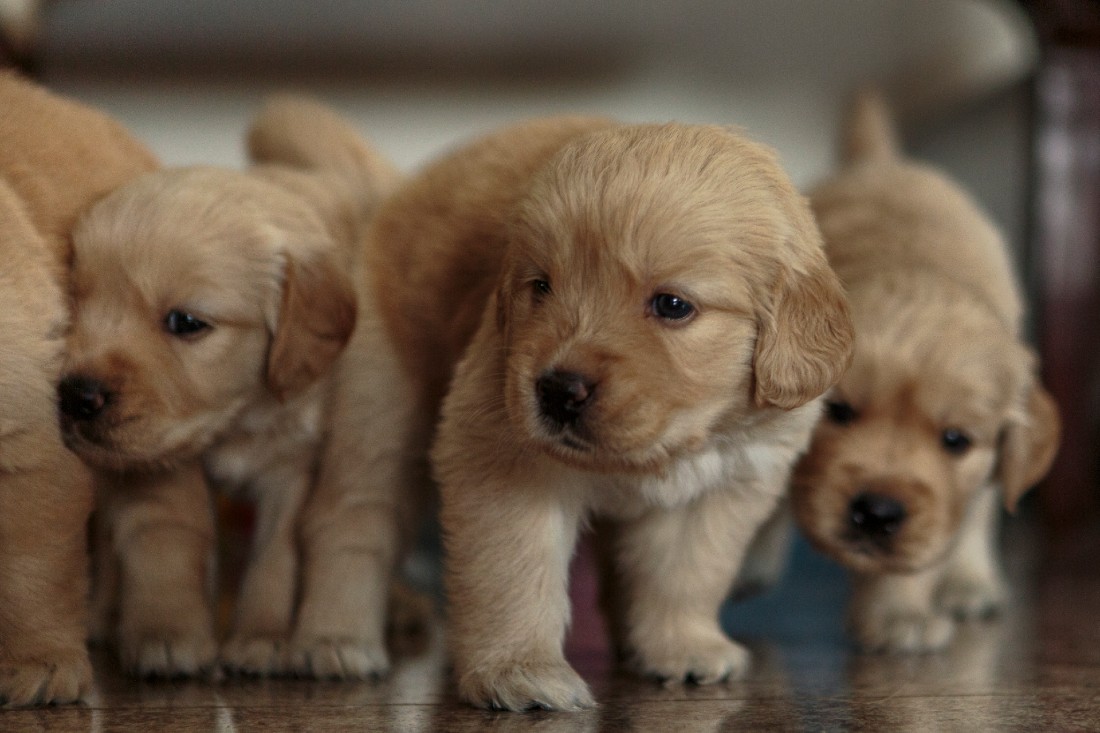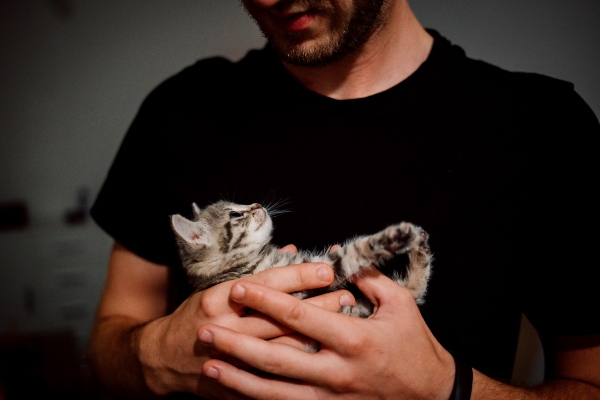You may have heard of ‘Catfishing’, where a stranger creates a fictional online persona to lure someone into a relationship.
Deceitful pet sellers use a similar tactic to ‘Petfish’ unsuspecting buyers. These unscrupulous sellers pretend that the puppy or kitten they’re selling you comes from a happy home.
In reality, the animal may have been bred or kept in poor conditions.
Don’t get caught out.
Buying or adopting a pet is an exciting time. But do you really know the person behind the advert?
Sadly, when you’re looking for a new cat or dog, you’re more likely to come across deceitful sellers than you might think. These sellers mistreat animals to line their pockets.
Welcoming these pets into your home can have tragic consequences. Some have severe health problems. Often, they won’t have been socialised with other animals or people. It’s important to do your research so you know your new pet has come from a responsible seller.
Watch our film to hear real-life stories from people who bought from deceitful sellers
"We found Max on a popular website that advertises different animals. It seemed like a normal family home."
Rebecca Reed, dog buyer
The introduction of ‘Lucy’s Law’ means that anyone wanting to get a new puppy or kitten in England must now buy direct from a breeder, or consider adopting from a rescue centre instead.
If you’re thinking of getting a cat or dog, here’s an essential checklist of what you need to do. By following these tips, you can make sure your new pet is healthy and happy.

Buying: What to consider when purchasing a pet
Buying a pet is an exciting time. But pets are a long-term commitment and you should always make sure you’re ready and able to commit to the responsibilities that come with caring for an animal before you start looking.
Given the high demand for pets you might find that responsible breeders now have waiting lists for dogs and cats. Buying a healthy animal that has been bred in good welfare conditions can take time but it is worth the wait.

Buying a puppy or dog
If you are buying a dog from a breeder, start by checking the Kennel Club’s Assured Breeder Scheme [external link], or look for a licensed dog breeder, whose licence number must be shown in the advert. You can check with the local authority that these details are legitimate.
Your choice of dog may be based on certain physical features, but it’s important to ensure that the dog’s physical appearance has minimal adverse impact their physical well-being and welfare. You can find further guidance on this in the CFSG Dog Conformation Guidance.
Use the Puppy Contract [external link] (PDF, 1.3MB, 17 pages) to help you get the information you need when buying a puppy. A good breeder will be happy to provide all the relevant information and sign the Puppy Contract for you.

Buying a kitten or cat
For kittens or cats, search The Governing Council of the Cat Fancy (GCCF) Breeder Scheme [external link] to search for breeders, by location or type of cat.
Use the Kitten Checklist [external link] (PDF, 2.4MB, 13 pages) to help you get the information you need when looking to buy a kitten.

A step-by-step guide: Buying a cat or dog
1. Before you contact the seller
Look carefully at the information given in the advert.
Check that the animal is older than 8 weeks
Puppies and kittens should never be sold under the age of 8 weeks old. Research the breed so you know roughly how big the animal should be at that age.
Pedigree kittens are usually re-homed when they are over 12-13 weeks old. This is to allow reputable breeders to have completed the kittens’ first vaccinations before they go to their new homes.
Search the seller’s name and details online
Are they advertising lots of litters from different breeds? If so, then they may be a deceitful seller.
Copy and paste the phone number and advert description into a search engine. If the same phone number is being used on lots of different pet adverts, or multiple adverts come up on different sites with different dates, this is a red flag.
Be careful if the pet is advertised with a 'passport'
If a puppy or kitten is advertised as having a pet passport, it may have been imported.
Puppies and kittens need to be at least 15 weeks to travel from the EU and certain other countries, or seven months old from unlisted ‘third’ countries. If they are advertised as younger than this but with a pet passport, this is a red flag.
Check whether your new pet will be vaccinated and socialised before you take them home
Make sure you understand what medical treatment your puppy or kitten will have had and how it will be socialised for the first few weeks of its life.
Low welfare sellers often won’t socialise animals, which can lead to behavioural issues for your new pet.
2. When you contact the seller
Always ring before you visit
Once you’re comfortable that the puppy or kitten seller looks reputable, make sure you ring them before arranging a visit. If they don’t provide a phone number, this is a red flag.
Don't feel under pressure
You should never feel pressured into buying a pet. Does the conversation feel rushed, or are they pushing for a quick sale? If so, this is not a good sign and you should look for a different seller.
A responsible seller will want the animal to go to a good home. The seller should be engaged and asking you questions to assess your suitability as an owner. If they are not doing so, this should be a warning sign.
Ask if they bred the animal themselves
The introduction of Lucy’s Law now means that it is illegal for people to sell puppies and kittens unless they have bred them.
Ask about medical history and microchips
Make sure you understand what medical treatment your puppy or kitten will have had by the time they are ready to leave their mother. Ask the following:
- Which vaccinations has the animal had?
- Which vaccines or boosters are still required, and when are they needed?
- Has the animal been neutered?
- Does the animal or its parents have any health issues?
- Is the puppy or kitten microchipped?
Although all dogs can suffer from inherited conditions, some breeds are affected more than others. Responsible breeders should be able to provide evidence that they provide health screening for parents and litters in line with specialist advice, such as that provided by the British Veterinary Association.
Remember to use the Puppy Contract and Kitten Checklist to cover off all the important information you will need.
Ask about behaviour and environment
Ask where the animal is being kept and how it’s being socialised. Deceitful sellers often won’t socialise animals, which can lead to behavioural issues for your new pet. Ask the following:
- Do the parents or the animal have any behavioural issues?
- How have you socialised the puppy or kitten?
- Will the animal’s mum be present when I visit?
- Can I see where the animal was bred when I visit?
3. When you visit the seller
Don’t buy your new pet on your first visit
You should always meet the seller, the mother and the litter in their home before agreeing to a sale. You shouldn’t feel rushed into paying a deposit before you’ve seen the pet in person. We also recommend using a traceable payment method and getting a receipt for any money paid.
Only agree to meet in the puppy or kitten’s home
Deceitful sellers often suggest meeting in a location that’s convenient for you – such as your own home, somewhere nearby, or a halfway point – to avoid showing you the animal’s living conditions.
They will use an array of tactics to fool you into thinking they are the person that bred the animal: sometimes the location has been rented for a short period of time and a different litter is being shipped in every few days for them to sell.
Make sure the mother and the rest of the litter are present
Unscrupulous dealers often separate the puppy or kitten from their family. You should see the animal interacting with its mother and siblings. You should also be able to see and handle the rest of the litter.
If you are given the chance to buy your pet without seeing the mother, or where it was raised, it suggests that it was reared in a low-welfare setting like a puppy farm.
Check for health or behavioural issues
When you meet the puppy or kitten, they should be sociable and alert, with bright eyes and no visible health issues. They should not look nervous or dirty.
If you are not sure how to identify health or behaviour issues, you should seek professional advice.
Ask for a copy of their medical records
Puppies should be microchipped from 8 weeks of age and registered to the seller before sale. Kittens may not be.
If the breeder claims the animal has been vaccinated and/or microchipped, ask to see records of these. Records include vaccination certificates and evidence of worming and flea treatments.
A good breeder will share these with you before sale, and will not claim that they have misplaced or that they will send them later.
If you are buying a pedigree pet, ask for proof of pedigree
For puppies, if they are advertised as Kennel Club registered, make sure you get a copy of their Registration Certificate before you buy the puppy. Similarly, for kittens advertised as GCCF registered, make sure you get a copy of the Registration Certificate before you buy the kitten.

Adopting: What to consider when rescuing or rehoming
There are plenty of reputable rescue centres, but sadly low-welfare sellers have been known to operate under the guise of a rehoming organisation. When rescuing or rehoming a cat, dog, puppy or kitten, keep the following in mind:
Choose a reputable rescue organisation
If you’re rescuing a cat or dog, you can start by checking if the rescue organisation is a member of the Association of Dogs and Cats Homes (ADCH) [external link].
A good rescue and rehoming organisation will check your suitability first and usually use an adoption contract. They will help you choose the right dog or cat for you and give you advice on caring for your new pet.
It’s best to rescue through a UK-based rehoming organisation
Some dogs and cats are illegally imported, and could carry diseases that are harmful to other pets. There is also a higher risk of behavioural and welfare issues due to poor breeding and rehoming.
If you are adopting a cat or dog from abroad, they need to be fully vaccinated against rabies. More information can be found at GOV.UK [external link]
Be careful if animals for adoption are advertised with a 'passport'
If a puppy or kitten is advertised as having a pet passport, it may have been imported.
Puppies and kittens need to be at least 15 weeks to travel from the EU and certain other countries, or 7 months old from unlisted ‘third’ countries. If they are advertised as younger than this but with a pet passport, this is a red flag.


Lucy’s Law: The ban on third-party sales
Commercial third-party sales of puppies and kittens were banned in England from 6 April 2020. Known as Lucy’s Law [external link], the law means anyone looking to buy or adopt a puppy or kitten must deal directly with the breeder or with one of the nation’s reputable rehoming centres.
Knowing the signs of unscrupulous sellers can help to tackle illegal or low welfare supply of puppies, kittens, cats and dogs. If you buy a pet from these sellers, you may not only end up with huge vet bills, but you will also help this cruel trade continue. Following these guidelines helps stop animal exploitation, so you can welcome a happy and healthy pet into your home.
Want to support the campaign?
We’re always keen to hear from any organisations wanting to get involved in the ‘Petfished’ campaign.
The easiest way to help support the campaign is to help amplify messages through social media. You can follow Defra’s accounts and like and share our Petfished posts. Our campaign hastags are #Petfished and #WhosBehindThePet
If you would like to offer more support to the campaign get in touch with the campaign team at getyourpetsafely@defra.gov.uk.
Photo credits for ‘step-by-step’ guide: Benjamin Dada, Madfish Digital, Ramiz Dedaković / Unsplash



